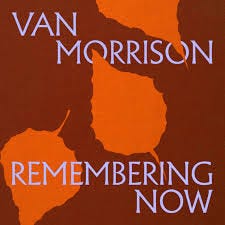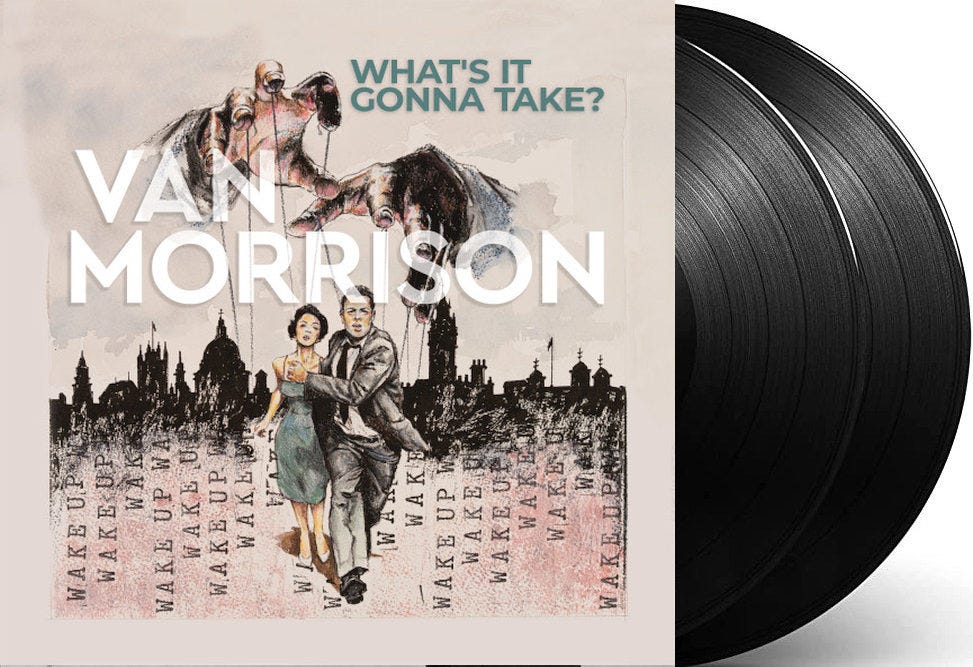The songster who has best captured the dissident persuasion, or mood, of the 2020s, is Van Morrison. I suspect that will change, as it will probably be someone from among the Z-sters, one who experienced what Covid-tyranny and Woke-tyranny did to one’s young hopes, who writes the songs which best capture the surreal shock of the era. For now though, in other arts we do have a fine book of Covid-dissident poetry from a early-Gen-Xer, Pole Shift by Sean Arthur Joyce, talk is growing of a lockdown-mocking film to be released this summer, Eddington, and in song, we have the two Morrison albums of the early 2020s, Latest Record Project, and What’s It Gonna Take?, as well as his opening salvo released seven months after the two weeks to flatten the curve lie, “No More Lockdown.”
“Down to Joy”
More on those in a moment, but there’s a new Morrison song out, “Down to Joy,” preparing us for a new album in June:
Sounds good, and the lyrics seem to point to the necessity of thinking, amid the seriousness of the 2020s fight against despotism, about joy. Or, as I pointed to for a couple of my 2022 posts, the necessity of thinking—with Josef Pieper—about festivity.
But why do Morrison’s lyrics say it is necessary to come “down” to joy? And who is the “she” in the song, who was “standin’ there before me,” or at least, was so through “her vision?” Is that a distinct vision? The same he had in the dream which begins the song? Why the mention of “gratitude,” and of the “glory” connected to the narrator’s “brand new story?” Is the “she” an angel of some kind? Or must we connect the song to an incident in the film it was written for, Kenneth Branagh’s Belfast?
But wait—is it a new song?
Well, structurally, that early 70s outtake is the same piece of music. And the title, and a few snippets of the lyrics are nearly the same. But the lyrics are significantly different, with the “she” being the idealized young hippie-ish woman who aides in the liberation of the singer’s soul, an archetypal figure in late-60s songs. (We encountered her, for example, in Morrison’s “Sweet Thing” helping him to “never grow so old again.”) The spirituality is different also—the 2025 song roots the positive feeling in a waking from a good dream, and perhaps in an angelic message/vision, whereas the early 70s one roots it in a “silence…behind us” when the singer and his beloved “heard the glory” connected to a “search for the sacred one,” which is labeled the “is-what-is-that-has.” The 2025 song is lighter, danceable, suited for the community-portraying Belfast clips, and due to its coming from a dream seems an old man’s song, naturally part of an album titled Remembering Now. The early 70s one is slower, evoking the young man’s walk through the world with a new wondering sense of reverence, and his housing his erotic yearnings within spiritual ones.
Well, you can do further interpretation/comparison of the two songs from there, if you wish. While it is the 70s one which sounds more mystic, it is the feels-simpler newer one which leaves more of our questions unanswered.
The other song-release from the new album, “Cutting Corners,” is less promising, but we’ll see—the track record of Morrison naturally leads to high expectations.
My Writing on 2020s Morrison
I passed on the last two Morrison albums, which were both cover-song affairs. Morrison clearly decided, after the lyrical heaviness of early 2020s albums—note that the musical feel was often bluesy-light—, to go back for a spell to the largely happy music of British skiffle and American rock ‘n’ roll. Merely comparing the titles and artwork of the What’s It Gonna Take? album with those of Movin’ on Skiffle and Accentuate the Positive convey where Morrison’s spirit was circa 2023-2024. There’s only so much of the grim news about the new era that one can live with.
The most essential of his albums from the 2020s, however, is definitely Latest Record Project, Volume 1, which he titled and presented in as unassuming a manner as possible, the better to deliver the stunner of its surprise: Van had gone full-on dissident!!! The album had 28 new songs, all reveling in fresh lyrical perspectives on life and Morrison’s career, but dominating the set were a dozen or so laying out a complete anti-Covidian, anti-Woke-ist, and anti-media/intelligence-agencies perspective. Among these were classic songs for the era: “Diabolic Pressure,” “Double-Bind,” “Western Man,” “Duper’s Delight,” “My Time after a While,” “Thank God for the Blues,” and “Where Have All the Rebels Gone?”
For more, see my long review of the album—it’s one of the best among my many pieces on music:
Key quotes:
…this new album feels like a potentially significant moment, a last chance for left-leaning but putatively “moderate” or “civil” baby-boomers to finally admit out-loud just how sour the progressivist project became, and especially over the last decade. A last chance to admit they got it wrong on a whole lot, and, as Van perhaps means to suggest in one lyric, that they got caught-up in a long con.
More:
Now a number of well-placed critics are saying Latest Record Project, Vol. I is awful, terrible, and no-good. …basically, these critics are lying. It is very strong in musical terms, and in lyrical ones, a heroic blow against the existing order.
I also wrote a pieces on two specific songs from the album, the first being “Where Have All the Rebels Gone?”
The key passage there referred to the shutting down of live music during lockdown:
Despite rock’s and bohemia’s long default preference for ever-greater personal liberty, and their valorization of underground and rebellious artistic activity, almost no stars of the music scenes spoke out against the confinements of everyone, or against the squashing of their own activity! …
And thus, Rock walked right into Morrison’s wallop of a lyrical blow, with its gloves down and chin extended way out.
I also did a piece on “Western Man,” which sets out a “farm parable” to articulate the political situation, and is able to convey some key truths:
…we have to conclude, not only that “going back to the way it was, now just seems near impossible,” but that we need to adopt a vision of Western freedom that is in some respects a “new path.” This is the truly golden insight of the song, the one that as a political theorist I treasure most. For it suggests that if “Western freedom” could be so decisively and quickly undone from within, then there was something flawed in our previous understanding and practice of it.
I of course also wrote on What’s It Gonna Take? when it came out in 2022, first on its best song, “Pretending,” and then a review of the album, one which also contrasted Morrison’s lockdown-commenting songs to several by an important millenial-gen rocker, Kevin Morby.
I indicated that the album contained four songs which probably should have been cut, and that overall, it is lesser work than Latest Record Project. Still, for the Covid-dissident, it’s essential. These are among the most anthemic songs written against the lockdown regime and the continued gaslighting of 2020-2021. I described their protest this way:
…[the rare] moments where [Morrison’s songwriting] deploys direct anger always feel on target, and never over-done. On that note I should also report that while the pre-release of “Pretending” and “Nervous Breakdown” had me expecting a somewhat down Morrison, the spirit of the new record is one that generally conveys confidence in the righteousness of his protest, even if a couple doubts about final victory are present, and “Pretending” is the final song.
As for “Pretending,” well, no other artwork I have yet encountered has so well captured the sense that with the advent of Covid, all our judgments of our societies circa 1990-2019, or even going back to the 60s, have to be revised, so much so that the activity of Remembering Now which Morrison’s new album promises cannot but be a quite different activity than remembering back in, say, 2016, when Morrison wrote the lovely little “Memory Lane.” For the entire feel of life has altered:
What the song “Pretending” tells us is that in dealing with friends and family, with music-business people, etc., Van has lately felt that just to get along and do his main duties, he’s been forced to play weird pretense games, where he acts like the person across from him hasn’t anything to gain from whatever particular and not-fully-just arrangement is being discussed, like they are playing fair, like they are friends, sincere persons, and thus really on his side, and like we are all still living in those 1970s-2000s times when it was usually safe to say what you felt, i.e., as if everything is open-wide.
But in fact, we now live in quasi-despotic societies, of uncertain destination…
So, I’ve written a more than a bit on Van Morrison in 2020s!
I again would point readers needing a review of Morrison’s larger career, most of which obviously took place prior to 2020, back to this excellent David Atkinson video. I’m not claiming that the 2020s stage of his career is the most important one. But I am wanting to let my newer Dissident Conservative readers see that my work here will not and cannot remain merely argumentative, merely politically-focused on my main topic of the Suppression, but, that my thinking always gets drawn into and gets further developed by things poetic. And so far, Morrison really is the poetic artist who has most fed our thoughts and spirits in this new era.









Van Morrison deserves credit for coming from the mainstream and saying these things. I like "Where Have All the Rebels Gone?". Then there are some emerging artists I only discovered a few years ago:
"Five Times August" which is really a singer-songwriter, Brad someone. Samples: God Help Us All, Outtayerdaminde
Tom MacDonald, samples: Names, The System.
Notably, Brad also makes his amazing videos, and Tom's girlfriend makes his.
Then there is one of my favorite jazz musicians, Hiromi, who did an amazing jazz-classical hybrid album, Silver Lining Suite. It addresses the moods created thru the "pandemic" without politicizing.
Beautiful essay. I had no idea about Van Morrison